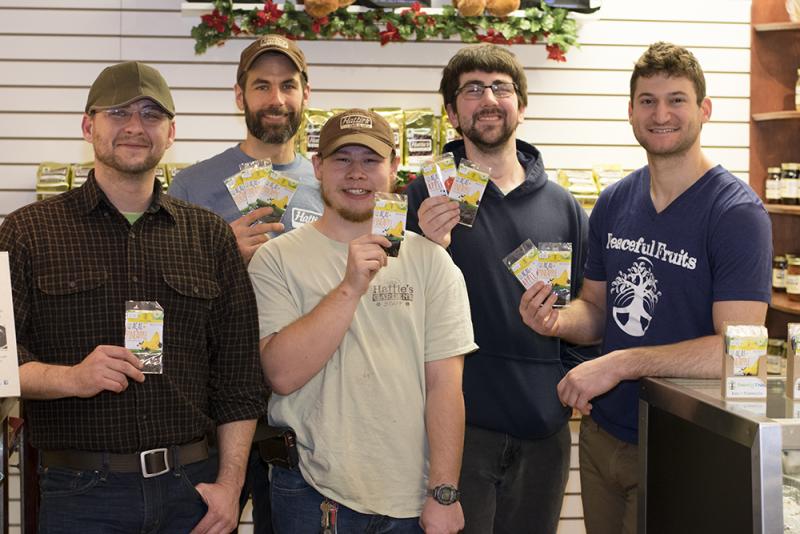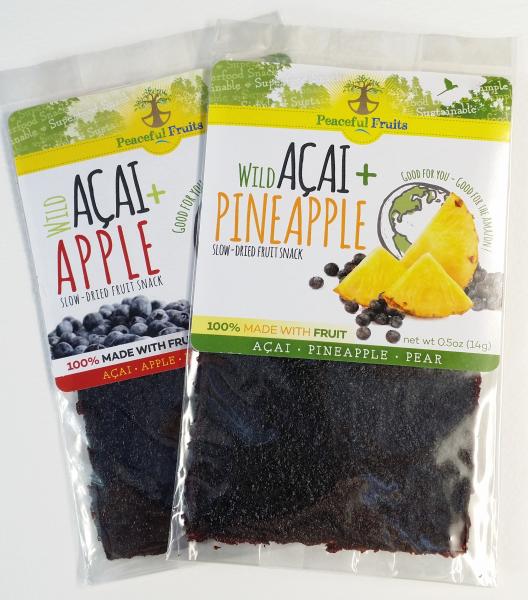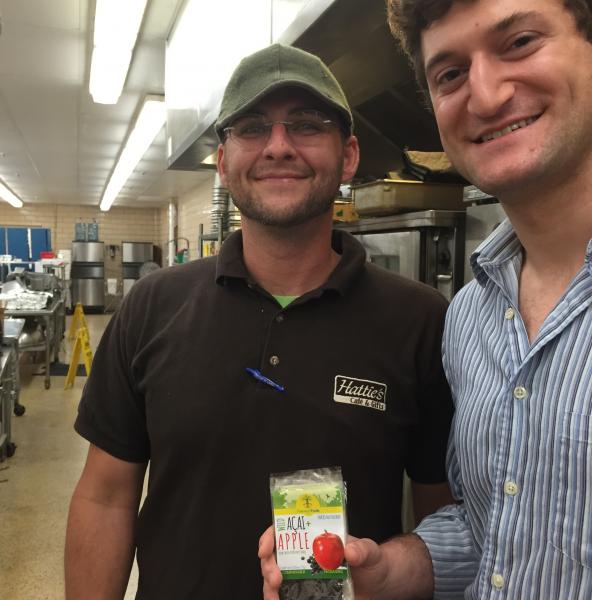Evan Delahanty says making fruit leather with acai pulp from the Amazon combined with fruits grown in the Akron area is a relatively simple process.
“We just mix them together and then we pour it onto a tray and put it in the dehydrator. And then when you pull it out it looks like this. I have had some people compare it to roof tar when they see it for the first time.” 
With what looks like a pizza slicer, he cuts the dried pulp into strips for packaging.
His father Michael, a retired Akron doctor, observes.
“I’m just very proud of Evan, his service in the Peace Corps and his hard work starting this business.”
A business with many purposes
Evan Delahanty is a man on several missions.
He wants to employ people with disabilities in meaningful work. He wants everyone to taste acai, the tropical treat he enjoyed in Surinam. And he wants to keep helping the people he worked with there as a Peace Corps community economic development specialist.
“I had a great experience there.”
He arrived in the smallest country in South America in 2011 and spent three months in a training camp in the capital city.
“And then I lived for two years in a small, indigenous village there, literally smack dab in the middle of the Amazon rainforest.”
Food off the trees
Living conditions were primitive. But Delahanty loved the food. 
“The nice thing about the rainforest obviously is that the food grows on trees in a lot of cases, and they are experts at knowing what is tasty and what’s in season, what’s appropriate.”
Delahanty learned about acai from the villagers he lived and worked with.
“The indigenous folk are huge snackers. You’re out working deep in the jungle, take a pause, and, ‘Oh, there’s a mango tree. Let’s just go knock off a couple of mangoes.'”
Hooked at first taste
But the snack Delahanty loved best in Surinam was acai. His first taste was the juice of the berry sweetened with cane sugar.
 “You’ll dip yesterday’s stale bread in the sugared juice. That was my first exposure to it which got me hooked right away.” “You’ll dip yesterday’s stale bread in the sugared juice. That was my first exposure to it which got me hooked right away.”
The acai berry grows on tall, slender palms and looks like a small grape. It has fewer antioxidants than grapes but more than oranges, and it’s relatively high in protein, fiber and omega fatty acids. But the FDA says there’s no scientific proof of health benefits and Evan Delahanty makes no health claims.
“In terms of some magical Amazonian cure for weight-loss, unfortunately, we’ll have to keep looking for that one.”
A socially conscious business
Acai might not be a super-food, but Delahanty saw soon after he started his Peace Corps service that the wild-foraged berries could be the basis of a super business.
“I wanted to start a company that focused on those things that just grow naturally and are already wonderful, healthy, and delicious.”
Delahanty explored the possibilities in his time off from helping villagers make improvements to their infrastructure and economy.
“I started talking to locals that were involved with making acai snacks and making acai juices and even just would harvest acai and give me some in the village because it was delicious.”
He paid attention to his taste buds but listened mostly to his heart.
He wanted to keep helping the people of the Amazon rainforest when his Peace Corp mission was over.
 And he saw that a business based on wild-harvested fruit could provide sustainable economic development that respects the local culture. And he saw that a business based on wild-harvested fruit could provide sustainable economic development that respects the local culture.
“They don’t have to cut down the trees and then plant something, or let someone else come in and then cut them down. It’s just what grows there naturally so they don’t have to change their way of life.”
Partnering with Hattie Larlham Foundation
Delahanty established Peaceful Fruits in 2013, about three months after coming home to Akron.
His father was his key consultant. “We were brainstorming about it, and I guess I came up with the idea of fruit leather.”
Initially Delahanty made the snacks himself at community kitchens in Cleveland and Akron, but he couldn’t keep up.
“And I was so excited when I found that Hattie Larlham was opening a food production center.”
Zach Reinberger manages Hattie’s Hub. “The product here is primarily made and packaged by the people who work in our programs at Hattie Larlham’s, individuals with developmental disabilities. It’s all in the realm of a training program to help prepare people for jobs in food service and food production.” prepare people for jobs in food service and food production.”
Reinberger says Delahanty’s Peaceful Fruits is a good fit.
“His mission’s a lot the same as ours. He wants to keep things sustainable. He wants to try to empower people.”
Hattie’s Hub employee Katherine Howe seals 3-by-5 inch packages of Delahanty’s fruit leather in biodegradable, certified-compostable bags.
“Do you like working with food, Katherine?"
"Yes. I’ve been doing it for a year.”
Not a foodie
As for Peaceful Fruits founder Evan Delahanty, this is his first time working with food.
“I’m definitely not a chef or even a great connoisseur of foods. I started this business wanting to be still tied in to the social and economic development for the people there in the Amazon.”
While running the business, he’s keeping his day job.
“I am a martial arts instructor at World Champion Martial Arts where I do sell my snacks as well, and they’re a great customer. The kids love it there, and the adults, too.”
Peaceful Fruits are also now available on Amazon and Akron-area food stores. |